Palmerston is the kind of place where people shipwreck. And stay, because of its odd, friendly charm. Or hop the next ship passing by, because of its odd, too-friendly charm. This island holds first prize for being both the weirdest and the most beautiful place yet on our voyage. You can only visit by sailboat, or via the supply ship that stops 3 times a year. All visitors are “adopted” by a family who feeds you and welcomes you — no one is allowed on the island unless accompanied by a host. Whoever makes the first contact with a boat becomes the host — and its a race among the locals to adopt foreigners.
A bit of natural history: Palmerston atoll is part of the Cook Islands, a country that contains 15 tiny islands that are scattered between America and Australia in the smack-dab middle of the Pacific. The closest island is over 100 miles south. Palmerston, like all atolls, is a volcanic ring of land surrounding a beautiful shallow lagoon. Unlike other atolls we’ve been to, Palmerston atoll is mostly submerged, and only a handful of small islands are visible above the water. The only inhabitated island is a whopping two square miles — you can walk around the whole island in 20 minutes. Birds, fish, sharks, whales, and turtles are plentiful, since human impacts are minimal.
A bit of human history: it was settled in 1863 by William Marsters, a British dude who brought three different Maori wives to start his own colony. His progeny now number in the hundreds, scattered across the Pacific from the Cooks to Australia. The majority of the islanders still have the last name Marsters. The island is divided into the three sections originally bequeathed by William to his three wives. Each of the three families has a “leader,” and the island also has a mayor. The cemetery is full of headstones honoring dozens of beloved past Marsters, most of whom are remarkably long-lived. The Palmerston natives are also remarkably well-traveled, and most of them marry someone from another island (so inbreeding seems minimal).
As of August 11th, when we arrived, 62 people lived in Palmerston, almost half of which were children. Only two residents were “outsiders” from the Marsters’ clan: the Fijian nurse, who was on a one-year travel stint, and the English school teacher, who wanted to see first-hand where her father shipwrecked in the 1950s — he spent a year on Palmerston rebuilding his ship before returning home. Speaking of which, the first thing we saw upon landing with our host on the island was a shipwreck from a sailboat that washed up on the reef in 2009, ironically from Rob’s hometown of Philadelphia. (After all the shipwreck stories, we triple checked our anchor chain during our four night stay.)
The two main “streets” are dirt, but they have street lights. There is no store, but there is an empty “Palmerston Yacht Club,” built by Bill Marsters and some yachties a decade ago. No one has a car, but most families have a big aluminum motorboat. About half of the island plays volleyball at 4pm every single day. We played with them for a few nights. The kids are welcoming, curious, and love to play “hit, bat, run,” which I tried to convince them was the same as baseball. They were enamored of my strangely colored hair and eyes.
No one uses money on the island, as there’s nothing to buy. But they do need money to purchase food, gas, diesel and other stuff when the supply ship comes every few months. The rest of the money goes toward traveling. People make money two ways: 1) selling parrotfish to Rarotonga, the capital of the Cook Islands; or 2) working for the government. Government jobs include: running the diesel generator that powers the ~15-20 buildings on the island (and the streetlights); teaching the 25 students at the “Palmerston Lucky School,” who range from age 5 to 17; working in the Customs and Quarantine Administration to check in the 40-50 sailboats per year and the occasional cargo ship that stops at the island; selling telecommunications services from the tiny booth set up next to the satellite (internet arrived on the island two years ago, along with cell phones).
Since we arrived on Sunday, we had to anchor outside the atoll and wait until the next day before checking in. Nothing except church is allowed to happen on Sunday in Palmerston. Our host was Simon, along with his incomprehensible and confusing array of nephews, brothers and cousins, most of whom were named “John.” I spent quite a lot of time listening to stories told by Simon’s 85-year-old toothless mother (but can’t remember her long Maori name, embarrassingly). She has 14 children, and long ago lost count of the number of grandchildren. Only 3 of her children live on the island currently, and the rest are mainly in New Zealand and Australia.
Imagine living with all of your extended family within two city blocks. Now imagine that those two blocks are in the middle of a huge ocean, with no one else to talk to for hundreds of miles. Suffice it to say that Palmerston is the most communal place I’ve ever been, where everyone is literally and figuratively one big family — a family like all others, marked by love, quarrels, support, grievances, understanding and sloppiness.
As for the ecology of Palmerston, it rivaled the social dynamics in its intensity. Here are a few highlights:
– We were welcomed to the atoll by three humpback whales that breached only 15 meters from our boat. Each sunset was punctuated by a whale spout or a whale tail.
– I saw two turtles mating (yes, having sex!), and was greeted during each morning swim by the same big turtle that swam up to say hi.
– Rob shot a beautiful parrotfish beneath the boat (which was delicious). Mark tried shooting a few squirrelfish that night, and abandoned the mission as several of the resident sharks swam over to investigate.
– The biggest groupers I’ve ever seen hung out on the reef outside the lagoon — easily 40 pounders. Rob saw one eat a two-foot parrotfish in a single bite.
– We took the dinghy to visit a few of the outer deserted islands, which sported the whitest sand and lushest coconut trees you can possibly imagine.
And the water? Too many colors to describe. I’ll poach from a book I just finished instead, “The Wave” by Susan Casey, which sums up the ocean around Palmerston perfectly:
If heaven were a color, it would be tinted like this. You could fall into this water and happily never come out, and you could see it forever and never get tired of looking. There could be no confusion about who called the shots out here, at this gorgeous, haunted, lush, heavily primordial place, with all its unnameable blues and its ability to nourish you and kill you at the same time.

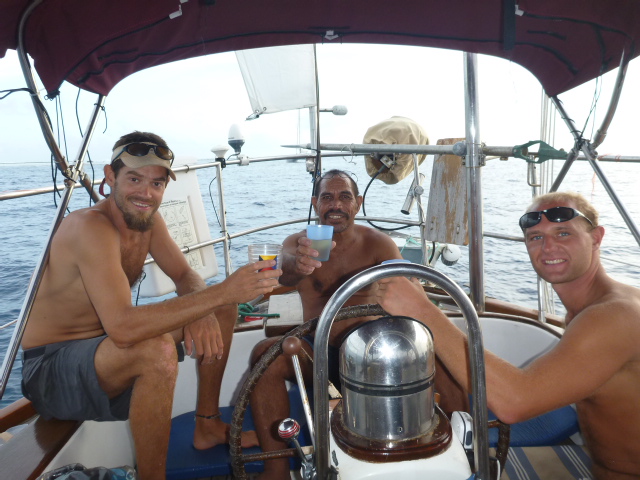
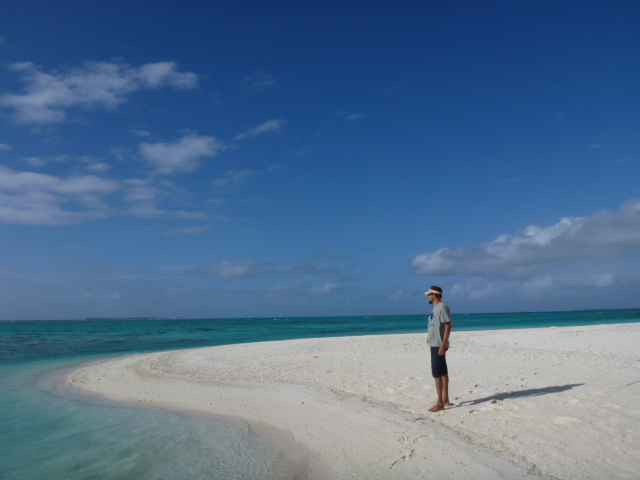
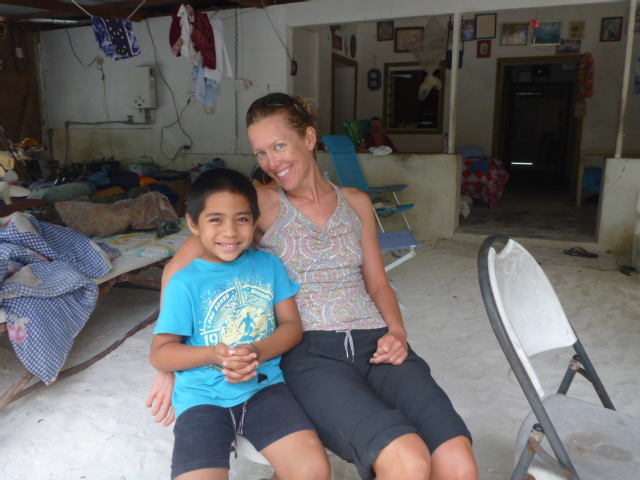
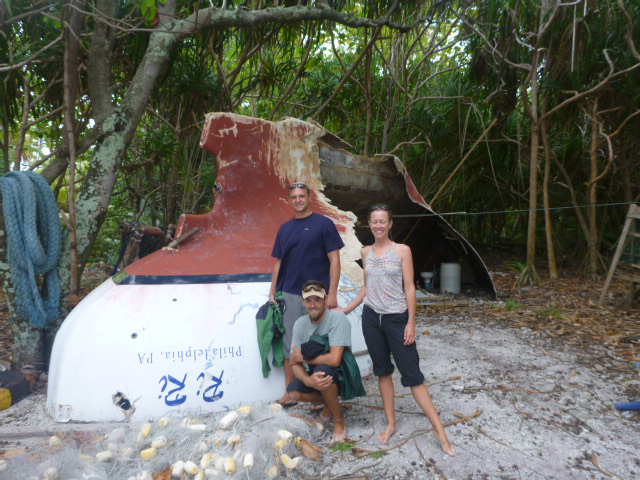



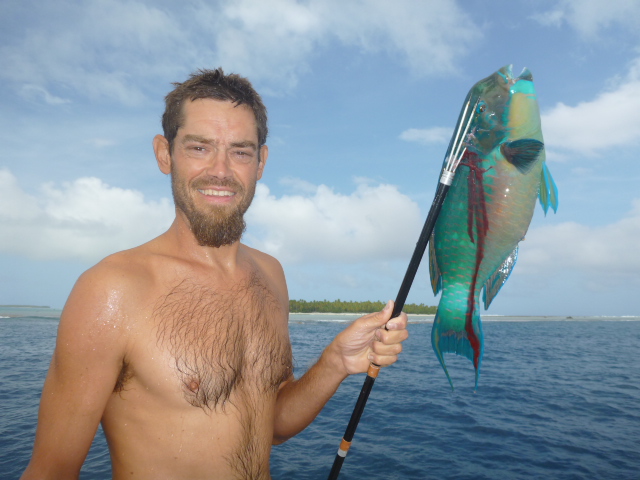
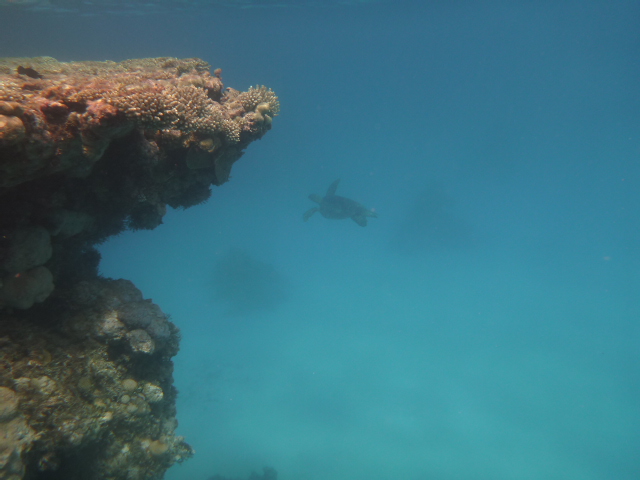

2 thoughts on “Adopted on Palmerston Island”
Greetings from the Garden City! Having a great time following your blog and love that you’ve arrived in the Cook Islands and Palmerston. What a beautiful place. You all look so happy and relaxed. Tom and I are so glad you’ve this amazing opportunity before you.
We start playing volleyball this week, so you’ve been on my mind, Rob, a bit more than usual. Stucky is out with a knee injury, Rose just had a baby last May, and Jeanna is out with a shoulder injury, so we’re bring on a couple of new players.
Fall has arrived, and it’s been chilly and rainy for about a week. It’s Homecoming Week at UM, so lots of friends will be rolling into town later this week. The Grizzly Football team lot to NAU last Saturday 34-16, so the honeymoon is over. Will be interesting to see how they do again Portland State this Saturday.
It’s nice to feel the chill in the air and see the snow on the mountain peaks after skipping through winter last year. We are looking forward to skiing and sledding this year.
We love your photos of fish, whales, turtles, friends and the local. What an amazing adventure! Thank you for sharing. You are such a great writer, Bri!
Anyway….thinking of you and following you and hoping you are healthy and happy. It appears to be so. Keep loving on each other and on the lands, waters, and peoples before you.
All Our Love,
Tom, Linda and Madelyn
I should really edit my stuff before posting. Sorry!
I forgot to tell you that we spent a week in Rarotonga, Cook Islands last January. What an amazing, beautiful, friendly place! So glad you’re there!